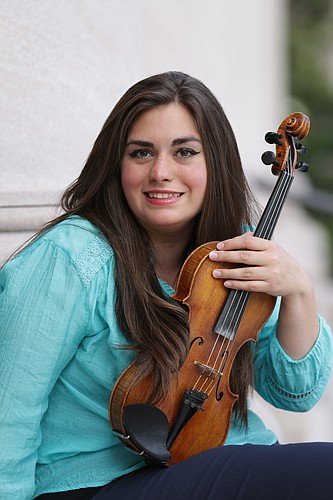- July 26, 2024
-
-
Loading

Loading

Mariela Shaker is a Syrian refugee.
In today’s United States, that’s a controversial label. But Shaker is teaching people to look beyond that identifier by utilizing a powerful tool: music.
“We hear a lot about refugees, and the stories in the media are always against them,” Shaker says. “I think the best way to form a conclusion about someone is be in front of them, so I hope people will be able to come and learn about what’s happening in a different part of the world … and hopefully they’ll be able to change their perspective.”
Shaker, a professional violinist, motivational speaker and college professor, will perform (and speak) Feb. 24 at Church of the Redeemer in a concert that will benefit refugees and misplaced persons in the aftermath of war.
The now 28-year-old musician came to the U.S. in 2013 on a full-tuition scholarship to Monmouth College in Monmouth, Ill. There, she received her second undergraduate degree, a Bachelor of Music Performance. Her first was a Bachelor of Science in business management from Aleppo University.
In theory, she didn’t seem much different than her Monmouth classmates. Like them, she learned her instrument as a child (she was 10) and was hooked. She started taking lessons at a prestigious school (the Arabic Institute of Music in her hometown of Aleppo), graduating with honors in 2004.
“I love expressing myself through the music I play,” Shaker says. “It was an amazing experience to be able to play classical music and music from the Middle East and combine both so people from the Middle East can be exposed to Western music.”
The biggest difference between Shaker and her classmates is when she left Aleppo to study in the U.S., she was escaping a civil war.
Ever since her childhood best friend immigrated to the U.S. when they were younger, Shaker had yearned for the chance to do the same. There aren’t many Syrians who pursue a career in classical music and thus the number of music schools in the country is limited, so she knew she’d have more opportunities in the U.S.
But she didn’t know she would have to flee her home country to get there.
Unlike her classmates, Shaker worked on her college application in internet cafes powered by generators. They were the only place with reliable electricity during the conflicts happening all around Aleppo. She was constantly hiding from bombs, and the attacks were getting worse every day.
The people around Shaker were advising her to take any opportunity she could to leave, so when she got accepted to Monmouth, there was no hesitation. Her best friend who had already moved to the U.S. said she could stay with her in Tampa for a month to get acclimated before heading up to Illinois, so they worked together to get her airfare booked.
In June 2013, Shaker left home to fly to the U.S. via Beirut, and the trip to the Lebanese capital — a trip that should normally take about 7 hours — took 17 hours.
“We didn’t know if we were going to make it,” she says. “After 10 hours of being on the bus we were surprised that we were still in Aleppo … It made me scared.”
The bus she was on wasn’t affiliated with a transit company, so Shaker knew the trip was dangerous, but it was the only way she could get to Beirut. After passing through more than 50 checkpoints, countless armed guards had to inspect her violin case because they thought is was holding guns.
Later, she learned three buses had been bombed that day, including one that her doctor was aboard.
She was thrilled when she made it to Tampa, but the successful journey was bittersweet.
“I was happy that I was finally safe, but of course I was so scared about my parents who were still in Aleppo struggling to get basic necessities of life,” Shaker says.
Getting here also meant she couldn’t turn back. She eventually applied for asylum in the United States and received another scholarship, this time to pursue a master’s degree in music performance at DePaul University.
Since moving to the United States, she’s wasted no time spreading awareness about refugees and “the other vulnerable people of the world.”
She says being a refugee taught her about hope, about generosity and how to live without fear, and she wants to spread a message of respect and perseverance to her audiences.
Those audiences have since included a crowd at the Kennedy Center, members of Congress and President Barack Obama, who honored her in 2015 with a Champion of Change for World Refugees award.
In 2017, she received her green card, and in 2018, the Anne Frank Center for Mutual Respect presented her with the first SAFA Promisekeeper Award.
“I would like to be an ambassador for my country in the U.S. and share all the great values I learned here worldwide,” she said in a 2017 TEDx talk at DePaul University. “I’m very proud to call America my home now, but … we need to remember that refugees are not a burden.”
But how does she spread this message through classical music? Shaker says music is louder than words, and whatever language her audiences speak, when she plays, they can understand the hope, joy and pain her journey to America caused her.
In the future, Shaker hopes to one day return to Syria, help rebuild her city and share her love of classical music with children there.
“I believe in it, music — it has a great message behind it,” she says. “It’s not going to feed a child or build a roof, but it can inspire changemakers to be active and do something. Music can heal the pain.”